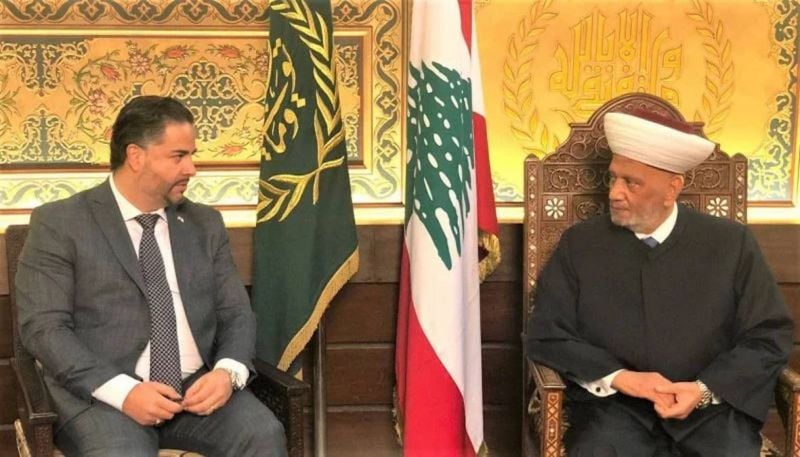
Caretaker Economy Minister Amin Salam, received by the Mufti of the Republic, Abdellatif Deriane, at Dar al-Fatwa last March. (Credit: Dar al-Fatwa website)
Amin Salam, the caretaker economy minister, who was once seen as a potential heir to caretaker Prime Minister Najib Mikati, now finds himself embroiled in a controversy reminiscent of a diplomatic crisis, one that threatens to undermine his political prospects.
What is the cause of this predicament? Salam said that Kuwait could reconstruct the silos at the Beirut port, devastated by the Aug. 4, 2020, “with the stroke of a pen.”
These remarks have sparked Kuwait’s ire, as they demonstrate, as the Kuwaiti foreign minister put it, “a limited comprehension of Kuwait’s decision-making process.”
Nonetheless, within a country grappling for financial aid to extricate itself from a crisis now in its fourth year, securing a political future requires a nod from the Gulf States. This holds particularly true for Sunni figures.
He could ‘see himself as prime minister’
Salam’s statements emerged following his announcement Thursday when indicated that he had dispatched a letter to Kuwait’s Emir, Nawaf al-Ahmad al-Sabah, “appealing to him on behalf of the Lebanese people ... for the reconstruction of the silos.”
Faced with the ensuing controversy, he swiftly retracted his comments, expressing remorse during a press conference for “the ambiguity surrounding the phrase ‘with a stroke of the pen’.”
Despite his attempts to backtrack, the damage was done. The incident bears semblance to the case of former information minister Georges Kurdahi who, due to contentious remarks about the Yemeni conflict (made when he was still a private citizen), precipitated a temporary rupture in diplomatic relations with the Gulf monarchies, ultimately led to his resignation from the Mikati government in December 2021.
It appears unlikely that Salam will follow a similar course of action, given that the crisis has been brought under control and that Mikati’s third administration has already resigned.
Even if he retains his position, Salam’s once-bright political prospects might be imperiled.
“Amin Salam’s aspiration to ascend to the role of prime minister is evident, yet both Arab and Western diplomatic circles remain skeptical about his suitability,” said a source with close ties to the “Club of Five” (a handful of former prime ministers usually who have always aligned with former premier Saad Hariri).
Salam’s intentions are far from clandestine. He openly aspires to wield influence within the Sunni community, which has been bereft of a leader since Hariri’s resignation in January 2022. This coveted role has remained unclaimed, primarily due to a lack of a figure carrying clout within the Lebanese scene and the absence of a Gulf endorsement of such a figure.
Salam’s introduction to public life was relatively recent, coinciding with his appointment to the economy ministry in September 2021.
He swiftly captured public attention. Reports indicate that he is close to the pre-American element of the political spectrum and that (ironically) he has family ties to Kuwait’s royal family — the Kuwaiti foreign minister being his cousin — and, above all, his selection through a mutual understanding between Najib Mikati and Free Patriotic Movement (FPM) leader Gebran Bassil.
Indeed, Salam’s brother-in-law is an FPM executive, and Bassil hoped that his appointment would be seen as a gesture of reconciliation to the international community.
This makes Salam one of the few Sunni figures not abhorred by the FPM camp with good connections. He is well aware of this and appears intent on making the most of it.
In June 2022, Salam took his first step toward establishing himself as a serious contender for the premiership, when the FPM refused to reappoint Mikati.
When then-President Michel Aoun summoned MPs to Baabda Palace to hold binding consultations and appoint a new premier after parliamentary elections, Salam said he was “ready” to take on such a responsibility.
“Several political blocs have contacted me,” Salam asserted in an interview. Although in the end he was not nominated by any of the MPs, leaving the field open to Mikati, Salam refused to give up, repeating to anyone who would listen that he could “see himself as prime minister.”
‘Collateral victim’
Meanwhile, while trying — in vain — to form a new cabinet, Mikati did not include Salam’s name in any of the lineup drafts he proposed, which seems as punitive measure for having challenged him.
Salam continued his strategy of rapprochement with the FPM, perhaps in hopes that he would indeed take office under the term of any future head of state, whose name would be greatly influenced by Bassil, as the FPM leader insists.
Salam thus boycotted the first cabinet meeting after the end of Aoun’s mandate, which Mikati convened in December, and which Christian forces, notably the FPM, deemed as unconstitutional — a stance that earned him a good point from Bassil.
The FPM leader praised “Salam’s loyalty” at a press conference a few days later.
In what appeared to be a bid to avoid stirring the pot, Salam attended subsequent government meetings — gatherings that conceivably could have occurred in his absence — ostensibly to shield himself from the censure of influential Sunni figures.
All his efforts will be in vain without Arab endorsement.
“Amin Salam is finished,” said the source close to the former prime ministers. “Ascending the premiership is now out of his reach. He’s the collateral victim of the Gulf countries’ fed-up attitude toward Lebanon.”
The controversy comes at a time when Gulf countries, including Kuwait, have issued stricter travel advisories recommendations for their nationals in Lebanon.
“Salam’s comments are far from scandalous in themselves,” the prime ministerial intimate said, “but Kuwait reacted in this way to send a clear message: the Arab countries will no longer finance Lebanon if it does not change course.”
This story first ran in French, translated by Sahar Ghoussoub.